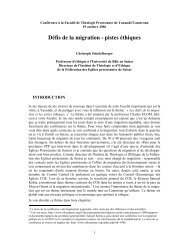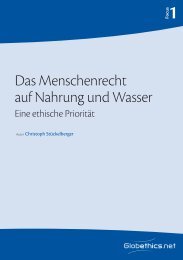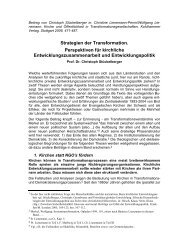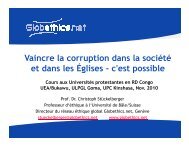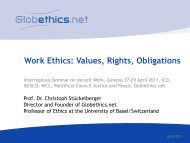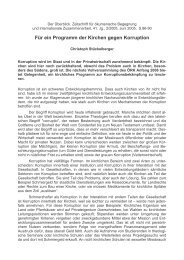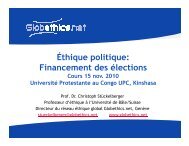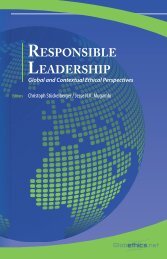BREAK THE CHAINS OF OPPRESION AND THE YOKE OF ...
BREAK THE CHAINS OF OPPRESION AND THE YOKE OF ...
BREAK THE CHAINS OF OPPRESION AND THE YOKE OF ...
Create successful ePaper yourself
Turn your PDF publications into a flip-book with our unique Google optimized e-Paper software.
DiaLo g<br />
come to stand: do they belong more on the side of the victims or of the perpetrators,<br />
or are they sometimes the one, sometimes the other? And I think Christians<br />
from the South too will feel themselves addressed by the definition of Empire:<br />
certainly first of all as members of a region which is suffering under the concentration<br />
of power described here and rightly sees itself as its victim. But then perhaps<br />
also as those who must recognise that the unholy amalgamation of power is<br />
also a problem within their own context. It is no accident that the third segment<br />
will speak about an all-encompassing global reality protecting and defending the interests<br />
of powerful corporations, nations, elites and privileged people.<br />
This kind of extension and deepening of the understanding of Empire becomes<br />
clearer if we now turn to the second segment of the definition. Here we meet the<br />
core of the newly won insight.<br />
(2) The Empire as “Lordless Domination” – the Theology of the<br />
Concept of Empire<br />
This is the most important advance of the new definition, that it gives Empire a<br />
theological base, and does so by reference to Karl Barth’s doctrine of the “lordless<br />
powers”. Now, what is this theological description about?<br />
The concept of Empire has repeatedly been accused of being ideological and<br />
confused, of making nothing really clear, of being incapable of connecting with<br />
a scientific analytical approach. And all this above all because it gets itself tied up<br />
in a mythological figure of speech.<br />
Now it was precisely Karl Barth in the last chapter of his Church Dogmatics (CD<br />
IV, 4, Fragment, § 78) who entered an earnest plea for this biblical “mythological”<br />
figure of speech � by �working �out its gain for �theological � insight. East of Eden,<br />
that is, in a life turned away from God, humans find that their planning, willing<br />
and acting turns against them. Their highest human capacities: organising themselves<br />
into a complex community, setting in motion processes of economic exchange,<br />
but also the developing of law, culture, science and technology – all this<br />
runs out of control, corrupted by human sin, just in the poem of the sorcerer’s<br />
apprentice. In the end humans no longer have a firm grasp of what they planned<br />
and set to work; it develops a dynamics of its own which turns against them and,<br />
although made by them, tears itself free of their control. Barth characterises precisely<br />
these forces as “lordless powers” and calls them “Empire”, “Mammon”,<br />
“Ideology”. He writes: The New Testament “sees and understands humankind<br />
not only as pushers but as pushed - not only as drivers but as driven … Without<br />
questioning their responsibility and guilt it sees behind and above them those<br />
unassailable but highly effective potencies, factors and agents, these imaginary,<br />
yet precisely in their imaginary character astonishingly active “gods” and “lords”.<br />
It is just these thoughts that the new definition picks up by understanding Empire<br />
as lordless domination, created by humankind. Only such theological “deep<br />
������������������������������������������������<br />
� � ����������������������<br />
�<br />
124<br />
– The Joint Globalisation – Dialog on Basic Issues –



